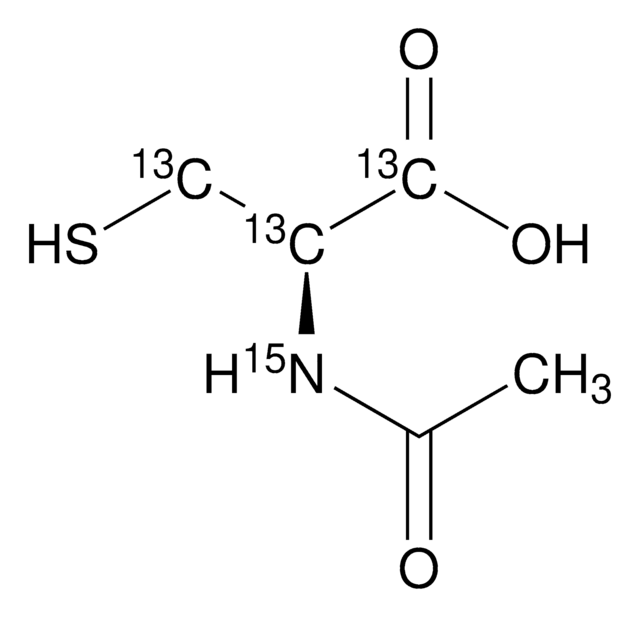A8199
N-Acetyl-L-cysteine
≥99% (TLC), suitable for cell culture, BioXtra
Synonym(s):
LNAC, NAC
About This Item
Recommended Products
Product Name
N-Acetyl-L-cysteine, BioXtra, ≥99% (TLC)
product line
BioXtra
Quality Level
Assay
≥99% (TLC)
form
powder
technique(s)
cell culture | mammalian: suitable
impurities
≤0.002% Phosphorus (P)
≤0.1% Insoluble matter
ign. residue
≤0.5%
color
white to off-white
mp
106-108 °C (lit.)
solubility
H2O: 0.1 M at 20 °C, clear, colorless
cation traces
Al: ≤0.0005%
Ca: ≤0.0005%
Cu: ≤0.0005%
Fe: ≤0.0005%
K: ≤0.005%
Mg: ≤0.0005%
NH4+: ≤0.05%
Na: ≤0.1%
Pb: ≤0.001%
Zn: ≤0.0005%
application(s)
cell analysis
storage temp.
2-8°C
SMILES string
CC(=O)N[C@@H](CS)C(O)=O
InChI
1S/C5H9NO3S/c1-3(7)6-4(2-10)5(8)9/h4,10H,2H2,1H3,(H,6,7)(H,8,9)/t4-/m0/s1
InChI key
PWKSKIMOESPYIA-BYPYZUCNSA-N
Looking for similar products? Visit Product Comparison Guide
Application
Biochem/physiol Actions
Not finding the right product?
Try our Product Selector Tool.
Signal Word
Warning
Hazard Statements
Precautionary Statements
Hazard Classifications
Eye Irrit. 2
Storage Class Code
13 - Non Combustible Solids
WGK
WGK 2
Flash Point(F)
Not applicable
Flash Point(C)
Not applicable
Personal Protective Equipment
Choose from one of the most recent versions:
Certificates of Analysis (COA)
Don't see the Right Version?
If you require a particular version, you can look up a specific certificate by the Lot or Batch number.
Already Own This Product?
Find documentation for the products that you have recently purchased in the Document Library.
Customers Also Viewed
Articles
Importance and uses of cysteine in serum-free eukaryotic, including hybridoma and Chinese Hamster Ovary (CHO) cell, cultures
Antioxidants protect biological systems from oxidative damage produced by oxygen-containing free radicals and from redoxactive transition metal ions such as iron, copper, and cadmium.
Chromatograms
application for HPLCOur team of scientists has experience in all areas of research including Life Science, Material Science, Chemical Synthesis, Chromatography, Analytical and many others.
Contact Technical Service











